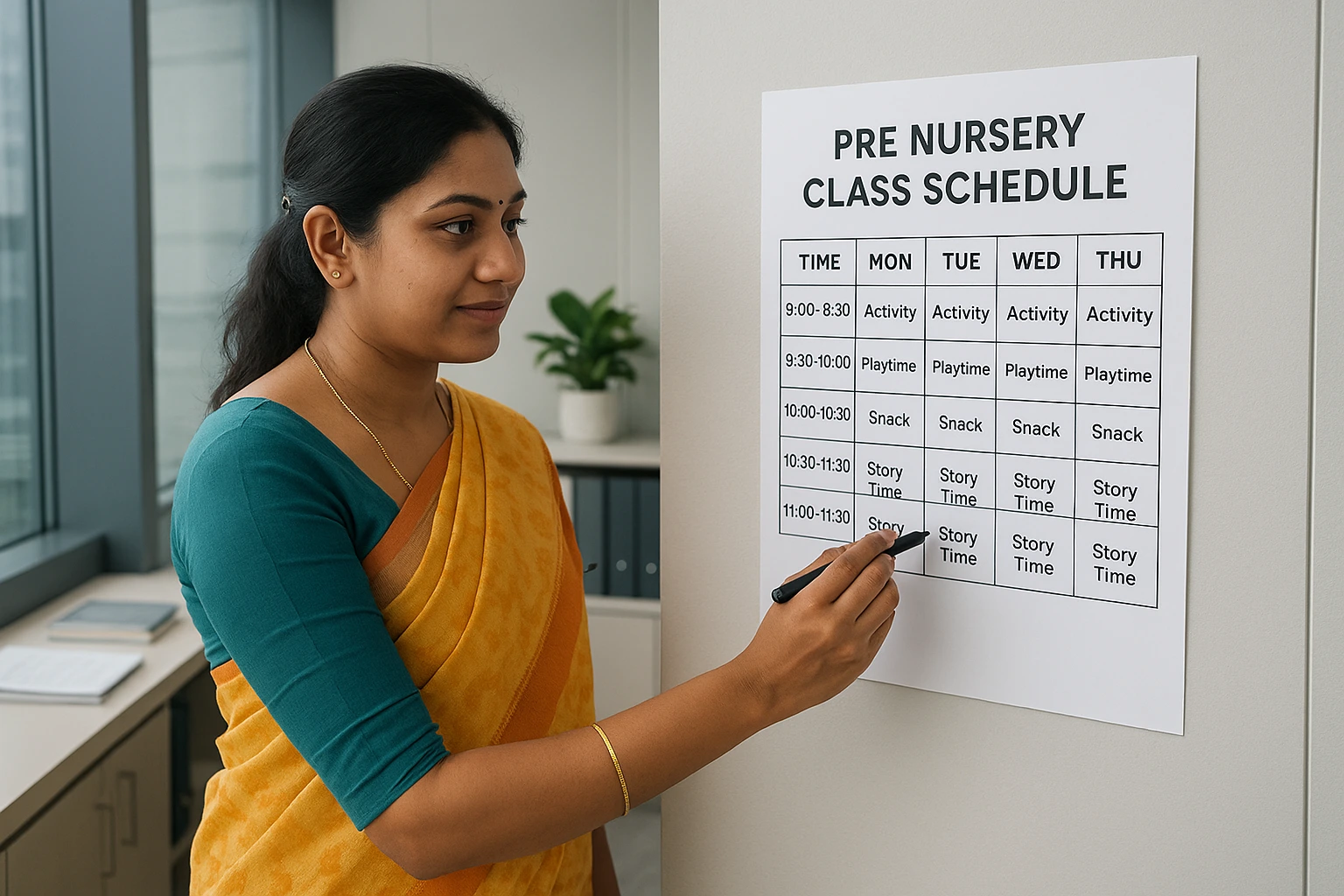How Types of Classroom Management Shape a Positive Learning Environment?
How Types of Classroom Management Shape a Positive Learning Environment?
A preschool classroom is a dynamic space where unexpected situations and disorder are certain to happen. Classroom management is an extremely important essential to maintain a positive learning environment. Early childhood Educators equipped with different Types of Classroom Management shape the growing and learning experiences of young children. A Education Management Course is a program that provides different types of classroom management and preschool organization to aspirants looking to dive into early childhood education.
Exploring diverse classroom management types through a Diploma in Education Management helps to manage behaviours, foster learning, maintain discipline, and support the overall growth of young children.
Table of Content
Proactive Strategies for Smooth Class Flow
Providing Early Care and Education to children aged between two to seven requires expertise and proactive strategies for smooth class flow.
Apply right techniques at right time leads to organized learning environment. Teachers apply proactive strategies to eliminate disruptions and foster a supportive learning environment.
Here are some proven proactive strategies for smooth class flow, explained in detail:
Clear Expectations from Day One
Setting clear, specific rules helps students know exactly what behavior is expected. Spend time at the start of the year or term discussing guidelines and why they matter. Referencing Classroom Management during this process ensures that rules fit the needs of diverse learners.
Consistent Routines and Procedures
Implementing a consistent routine helps children build a habit of doing structured work daily without being disordered. Awareness of daily routines helps to eliminate disruptions and confusion.
Positive Encouragement
Recognizing and appreciating the good behavior of students motivates them to continue positive work.
Engaging Lesson Planning
An engaged student is less likely to disrupt class flow. Students’ engagement increases the productivity of learning.
Strategic Classroom Arrangement
Classroom Management emphasize physical arrangement as a silent influencer on class behavior.
Unceasing Modification
Teachers observe and asses the areas of improvement, then apply modified techniques to contributing to smooth class flow.
Student Connection
A healthy student-teacher relationship is crucial to maintain smooth class flow. Teachers understand the needs of children and provide to them with responsiveness to make children feel valued.
Early Involvement
Addressing small issues before they escalate is critical. If a student starts showing signs of distraction or frustration, offering a quick, calm reminder can prevent larger disruptions. Different Types of Classroom Management suggest that early intervention keeps minor concerns from becoming major problems.
Smooth class flow is ensured through proactive strategies that trained educators apply effectively. With a Diploma in Education Management Course, participants will learn to classroom management that equip educators with the proficiency to maintain a stimulating learning space.
Click Here, for downloading the brochure of Diploma in Education Admin Course!
For the details of Diploma in Education Admin Course, Call or Whatsapp on +919869546913 / +919869866277.

Building Trust through Consistent Routines and Positive Environment
A structured flow in the learning process maintains the attention of students and enhances academic success. To build a trustworthy classroom environment, consistent routines play a major role. It makes teachers and students aware of daily classroom tasks and maintain productivity.
Let’s see the advantages of constant routines that maintain a positive environment:
Consistent Routines: The Backbone of Trust
Consistent routines are the core foundation of an effective and positive classroom environment. Constant daily tasks make children aware of what to expect next and how to behave.
Establishing Clear Daily Schedules
Predictable schedules help students transition smoothly from one activity to another and stay focused.
Following Through with Promised Actions
If a teacher sets rules or makes commitments, following through is crucial. Broken promises can lead to distrust. Sticking to routines shows students that their teacher is reliable, a key factor in building lasting trust.
Adapting Routines Thoughtfully
While consistency is important, minor adjustments are sometimes necessary. Explaining changes clearly in advance maintains trust. Among the various Types of Classroom Management, this blend of consistency and flexibility promotes both order and understanding.
Positive Environment: Nurturing Student Growth
A positive environment is another critical part of successful Types of Classroom Management. Positive environment on appreciates good behaviours and eliminating negative behaviours with awareness of consequences.
Setting Clear and Kind Expectations
Creating clear, easy, and purposeful rules makes children disciplined, organized, and respectful.
Promoting Mutual Respect
Praising respectful behavior reinforces a culture of kindness. Types of Classroom Management systems, creating spaces where students can express themselves without fear.
Teachers can create a stimulating learning environment where students are inspired to learn and grow inclusively. With a Diploma in Education Management, training, participants develop various types of classroom management methods and help them build a positive learning environment.
Click Here, for downloading the brochure of Diploma in Education Management Course!
For the details of Diploma in Education Management Course, Call or Whatsapp on +919869546913 / +919869866277.

Source: salwanpublicschool
Which are Courses Required to Gain Classroom Management Skills?
Classroom management skills can be gained through any teacher training program. But a Diploma in Education Management offers a deep focus on educational management and administration. It offers topics
Vidhyanidhi Education Society (Govt Regd.) offers two valuable programs that focus on developing expertise in different Types of Classroom Management strategies:
Diploma in Education Management
This aims to provide strategies for effective management of the school’s operation and maintaining an organized classroom. Trainees gain knowledge of record-keeping of students, creating activities that eliminate disruptions, maintaining student engagement and lot more.
Building Student Relationships
The course emphasizes trust-building activities and communication techniques that strengthen teacher-student bonds, resulting in fewer behavioural issues.
Effective Conflict Resolution
This training develops practical methods to handle and solve conflicts logically, ensuring a positive and thriving learning environment.
Through the Diploma in Education Management, aspiring educators the equipped with strategic techniques of classroom management.
Diploma in School and Management Course
The Diploma in School and Management Course by Vidhyanidhi Education Society is another strong pathway for gaining expertise in Types of Classroom Management.
This course covers:
- Policy Framing and Implementation
- Leadership and Supervisory Skills
- Handling Special Classroom Situations
- Organizing the Learning Space
Courses like the Diploma in Education Management and the Diploma in School and Management Course by Vidhyanidhi Education Society (Govt Regd.) are perfect stepping stones to mastering different Types of Classroom Management. With structured training and real-world strategies, teachers can create positive classrooms where every child thrives.
Shape futures! Join Vidhyanidhi Education Society’s Diploma in Education Admin Course today!
Click Here, for downloading the brochure of Diploma in Education Admin Course!
For the details of Diploma in Education Admin Course, Call or Whatsapp on +919869546913 / +919869866277.
FAQs
How can Routines Create a Positive Classroom Culture?
With a well-maintained routine, the classroom can thrive on a positive culture because students and teachers are aware of the flow of tasks to be done in a day.
What Role does Student Engagement Play in Classroom Management?
Student Engagement plays a crucial role in Classroom Management, as it increases active participants and reduces bad behaviours.





